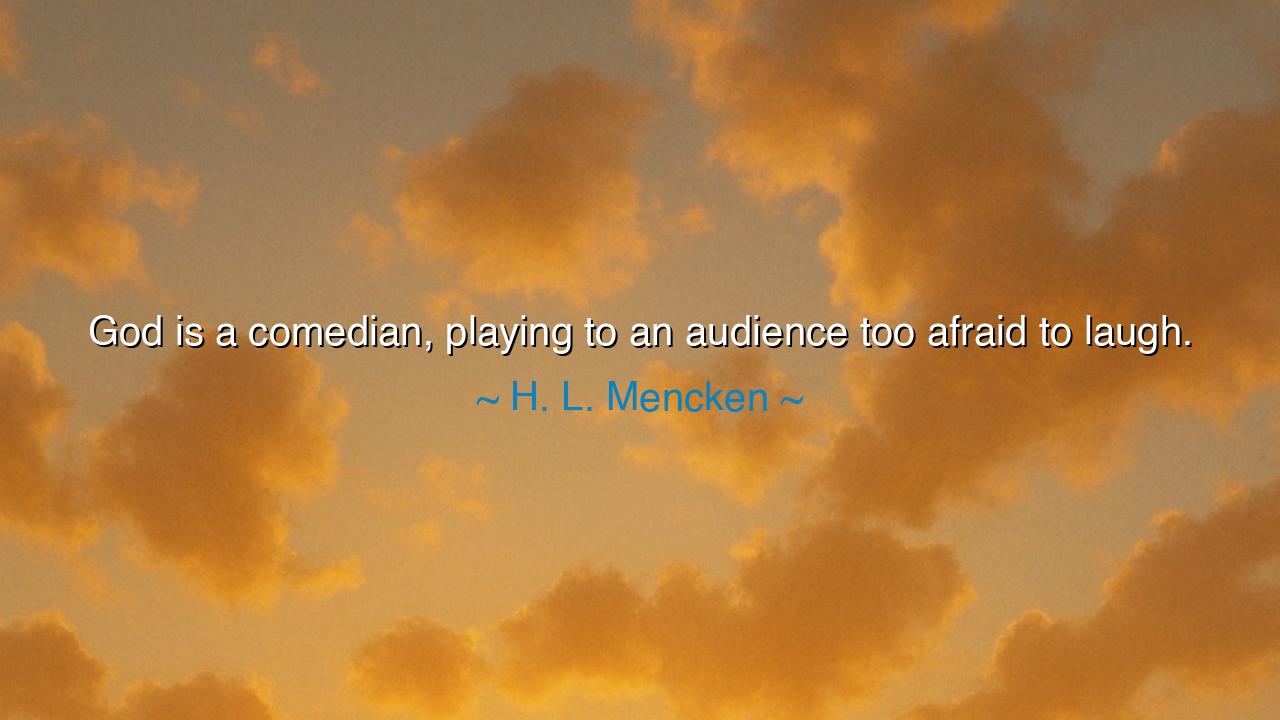
God is a comedian, playing to an audience too afraid to laugh.






Hear the biting yet luminous words of H. L. Mencken, the sage of irony and laughter, who declared, “God is a comedian, playing to an audience too afraid to laugh.” In this saying, Mencken spoke not from mockery, but from revelation—a revelation of the tragic comedy of human life. His voice, sharp as the edge of truth, exposes the strange tension between divine humor and human fear. For what is this world, with all its paradoxes and absurdities, but a stage upon which men and women act their parts, while Heaven itself smiles at the folly of our solemnity? Mencken saw the sacred irony of existence: that creation is filled with wonder, beauty, and contradiction, yet mankind, blinded by pride and superstition, forgets to laugh at the divine jest.
The origin of this quote arises from Mencken’s lifelong dance with faith and skepticism. Living in an age of upheaval—when science challenged dogma and modernity unmasked the pretensions of religion—Mencken observed how people took their beliefs and themselves with unbearable seriousness. He saw that in their fear of doubt, they built rigid systems to explain the infinite, and in doing so, they lost the capacity for joy. Thus, he called God a comedian, not to blaspheme, but to awaken men to humility—to remind them that the divine may not be a tyrant of thunder, but an artist of irony. The comedy of God lies in the vast contrast between His infinite creation and man’s small attempts to define it, between the grand design of the cosmos and our desperate need to control it.
Consider how the ages have revealed this truth. When Galileo gazed into the heavens and found that the earth was not the center of all things, the powerful trembled. They feared laughter—the laughter that comes when pride is exposed. They condemned him, for his discovery made them feel small before the vastness of God’s universe. Yet in that moment, Heaven must have smiled, for truth had triumphed over arrogance, and the divine joke had unfolded: that even those who claim to know God can still be blind to His boundless creation. The same pattern repeats in every age—humanity clings to certainty, builds idols of its own making, and fears the liberating laughter that comes with humility.
To say that God is a comedian is to recognize that creation itself is filled with divine irony. The rain falls on both saint and sinner. The strong become weak; the weak rise to greatness. Kings die as beggars, and fools speak the wisdom that scholars ignore. The universe is not chaos—it is a play written by a hand that delights in reversal and surprise. Yet, as Mencken laments, the audience is too afraid to laugh. We take our failures as eternal doom, our triumphs as ultimate glory, our doctrines as final truth—forgetting that perhaps, the divine purpose of it all is not to torment us, but to teach us through the gentle laughter of imperfection.
Think of Socrates, the wisest man of Athens, who declared that he knew nothing. His humor was holy. He could laugh at the pretensions of politicians and the absurdities of human reasoning because he understood what few dared to admit—that wisdom begins in humility. Like Mencken centuries later, Socrates stood before an audience too afraid to laugh at itself. They condemned him for irony, for daring to question their self-importance. Yet in his death, the cosmic joke was complete: the man they silenced became the eternal voice of truth, while his judges faded into dust.
The heart of Mencken’s saying is not cynicism but awakening. It teaches that fear is the enemy of joy, and that reverence without laughter becomes idolatry. When we forget how to laugh at ourselves, we mistake our small truths for absolute ones. To laugh, then, is not to mock the sacred—it is to recognize our place within it. Laughter becomes a kind of prayer, a confession that we are part of something greater, more mysterious, and infinitely more playful than we can imagine. The one who can laugh in the face of uncertainty has understood the divine rhythm of life.
Therefore, let this wisdom be passed down: Do not fear the laughter of God. When life humbles you, laugh—not in despair, but in surrender to the beauty of its mystery. When your plans fail, when your certainties crumble, remember that you are but an actor in a divine comedy whose author writes with infinite wit and mercy. To laugh at yourself is to accept the truth of your humanity; to laugh with Heaven is to share in its joy.
And so, O child of the earth, remember: God’s comedy is not mockery—it is mercy. The Creator’s laughter is the music of grace, reminding us that even in our confusion and pride, we are loved. Learn to smile at the absurdities of the world, to find meaning in its chaos, and to meet every moment—sorrowful or sweet—with a light and grateful heart. For in doing so, you will no longer be part of the fearful audience. You will become a participant in the divine play itself, and at last, you will laugh with God.






AAdministratorAdministrator
Welcome, honored guests. Please leave a comment, we will respond soon